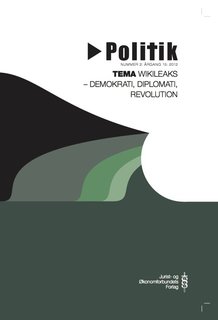Wikileaks’ demokratiske potentiale
DOI:
https://doi.org/10.7146/politik.v15i2.27511Resumé
WikiLeaks has faced much criticism after massive leaks of secret US military les and diplomatic cables, revealing both trivial and compromising details of the superpower’s judgments and actions in international politics. However, in this article we argue that WikiLeaks harbours a democratic potential, which so far has been overlooked, principally because the organisation’s activities have been interpreted within a traditional Weberian theory of power focused on strategic action. Relying on Martin Saar’s re ections on power, we argue that WikiLeaks is more fruitfully understood in terms of an ontological theory of power focused on the subjectivity-constituting function of power and power as a constitutive space of potential ways of being. Placing WikiLeaks within Jürgen Habermas’s diagnosis of our present social and historical context, we argue that WikiLeaks – despite its obvious faults – harbours a democratic potential by constituting the possibility for democratic criticism of globalised functional systems that increasingly undermine the necessary condi- tions for the e cacious exercise of popular sovereignty.
Downloads
Publiceret
Citation/Eksport
Nummer
Sektion
Licens
Forfattere, der publicerer deres værker via dette tidsskrift, accepterer følgende vilkår:
- Forfattere bevarer deres ophavsret og giver tidsskriftet ret til første publicering, samtidigt med at værket er omfattet af en Creative Commons Attribution-licens, der giver andre ret til at dele værket med en anerkendelse af værkets forfatter og første publicering i nærværende tidsskrift.
- Forfattere kan indgå flere separate kontraktlige aftaler om ikke-eksklusiv distribution af tidsskriftets publicerede version af værket (f.eks. sende det til et institutionslager eller udgive det i en bog), med en anerkendelse af værkets første publicering i nærværende tidsskrift.
- Forfattere har ret til og opfordres til at publicere deres værker online (f.eks. i institutionslagre eller på deres websted) forud for og under manuskriptprocessen, da dette kan føre til produktive udvekslinger, samt tidligere og større citater fra publicerede værker (se The Effect of Open Access).

